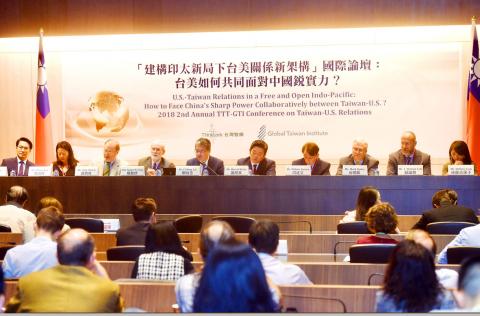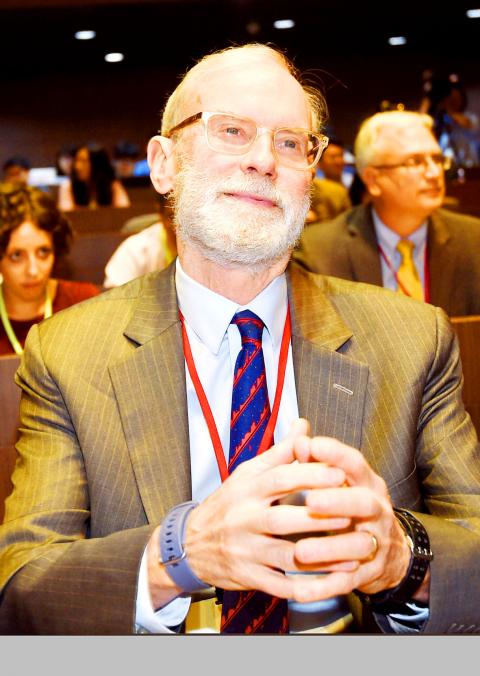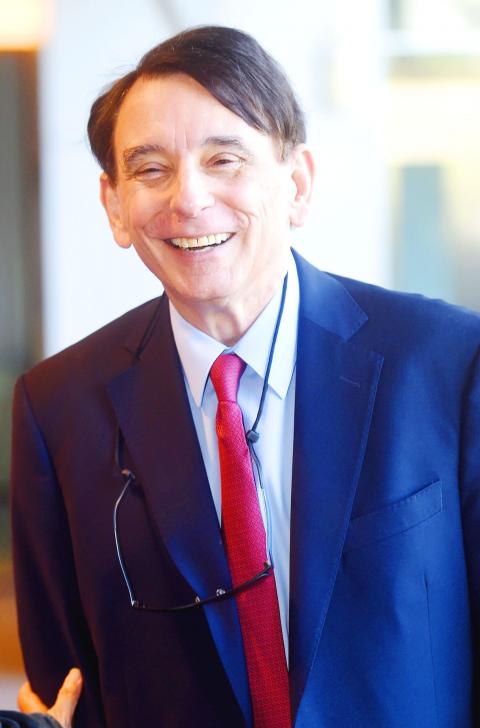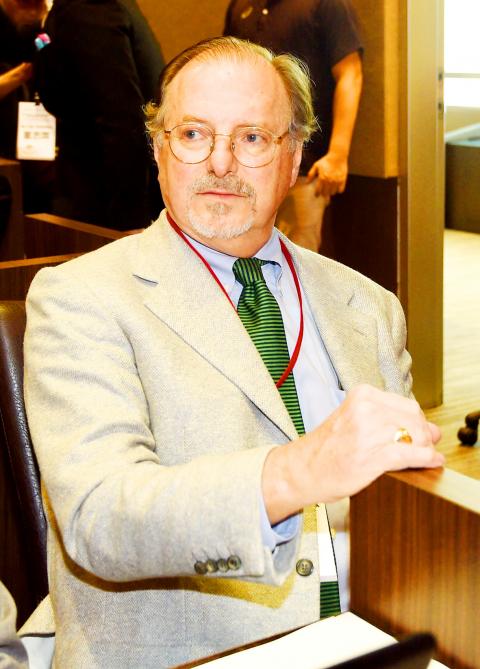Two former American Institute in Taiwan (AIT) directors and other analysts from the US yesterday urged a renewed effort between the US and Taiwan to negotiate a free-trade agreement (FTA) as President Tsai Ing-wen (蔡英文) struggles to convince Taiwanese not to depend on China for economic prosperity.
They made the call at a forum on Taiwan-US relations hosted by the Taiwan Thinktank and the Washington-based Global Taiwan Institute in Taipei.
This year’s event focused on how Taiwan and the US can work together to face China’s power.

Photo: Chien Jung-fong, Taipei Times
As China’s sharp power influence grows, in addition to finding a more creative approach to support Taiwan’s military needs and encouraging visits by senior-level US officials, Washington should also renew efforts to nail down an FTA with Taipei at an early date, former AIT director Stephen Young said.
“But Taiwan needs to do something to control some of its agricultural lobby demands,” Young said, referring to opposition to the lifting of a ban on the import of US pork containing the leanness-enhancing drug ractopamine and US beef offal products.
Taiwan’s import restrictions on US pork and certain beef products have long been considered a major hurdle in trade relations, most notably impeding the signing of a Trade and Investment Framework Agreement (TIFA).

Photo: Chien Jung-fong, Taipei Times
Former AIT director William Stanton said the US government should also look at the inking of an FTA with Taiwan from a more strategic point of view.
“If you look at the history of the US’ FTAs, the very first FTA we had was with Israel. Was it because we thought Israel was an important economic partner? Or why did we have an FTA with Morocco or Jordan? Was it because they were important economic partners? No, it was … for strategic reasons,” he said.
In the same vein, the US needs to think more strategically about Taiwan and “not just simply [about] the need to export more pork to Taiwan,” Stanton said.

Photo: Chien Jung-fong, Taipei Times
Nien Su (蘇思年), a former chief economic adviser to the US House of Representatives Committee on Foreign Affairs, said that with the strong bipartisan support Taiwan enjoys in the US Congress, free trade is an area both sides can work on, but the Taiwanese government needs to give a clear signal of intent to the US.
Taiwan and the US should make free trade a priority next year and try to achieve positive movement on trade negotiations or any type of agreement before 2020 to avoid another missed opportunity, Su said.
The window of opportunity is rapidly closing as more issues are being put on the plate of US policymakers, he added.

Photo: Chien Jung-fong, Taipei Times
However, Project 2049 Institute executive director Mark Stokes suggested signing a fair-trade agreement instead.
A fair-trade agreement would not only be in the US’ political interest, it would also be conducive to Taiwan and the US moving toward a more normal, stable and constructive relationship, said Stokes, a former Pentagon official who served as senior country director for Taiwan and China.
Commenting on the nine-in-one elections, Taiwan Thinktank chairman Wu Rong-i (吳榮義) said it was very “regrettable” that during the campaign, Taiwan had suffered systematic and organized disinformation efforts from China designed to influence Taiwanese voters.
“China is also facilitating the dissemination of false information through the control of newspaper, television, radio and online media in Taiwan. Even more disturbing is that China has directly supported the pro-China forces within Taiwan to speak on behalf of Beijing,” Wu said, calling China’s sharp power a “Trojan horse.”
Stanton said he only has one concern regarding Taiwan’s recent elections, which is that some people might misinterpret the results as that the majority of Taiwanese hope to see a closer cross-strait relationship.
He said economic issues, such as low salaries and high housing prices, were more likely the reasons behind the Democratic Progressive Party’s losses.
John Tkacik, director of the US-based International Assessment and Strategy Center’s Future Asia Project, said China is a rising power that is attempting to dismantle the geopolitical “status quo” in the Indo-Pacific.
“Taiwan’s unique geographic position in the Western Pacific … fits into the partnership strategy to meet the challenges of China’s global aspirations, i.e. the ‘China Dream’ and the Belt and Road Initiative,” Tkacik said.
Taiwan has a clearly important role to play in keeping the Indo-Pacific region free and open, he said.

INVESTIGATION: The case is the latest instance of a DPP figure being implicated in an espionage network accused of allegedly leaking information to Chinese intelligence Democratic Progressive Party (DPP) member Ho Jen-chieh (何仁傑) was detained and held incommunicado yesterday on suspicion of spying for China during his tenure as assistant to then-minister of foreign affairs Joseph Wu (吳釗燮). The Taipei District Prosecutors’ Office said Ho was implicated during its investigation into alleged spying activities by former Presidential Office consultant Wu Shang-yu (吳尚雨). Prosecutors said there is reason to believe Ho breached the National Security Act (國家安全法) by leaking classified Ministry of Foreign Affairs information to Chinese intelligence. Following interrogation, prosecutors petitioned the Taipei District Court to detain Ho, citing concerns over potential collusion or tampering of evidence. The

‘FORM OF PROTEST’: The German Institute Taipei said it was ‘shocked’ to see Nazi symbolism used in connection with political aims as it condemned the incident Sung Chien-liang (宋建樑), who led efforts to recall Democratic Progressive Party (DPP) Legislator Lee Kun-cheng (李坤城), was released on bail of NT$80,000 yesterday amid an outcry over a Nazi armband he wore to questioning the night before. Sung arrived at the New Taipei City District Prosecutors’ Office for questioning in a recall petition forgery case on Tuesday night wearing a red armband bearing a swastika, carrying a copy of Adolf Hitler’s Mein Kampf and giving a Nazi salute. Sung left the building at 1:15am without the armband and apparently covering the book with a coat. This is a serious international scandal and Chinese

Seventy percent of middle and elementary schools now conduct English classes entirely in English, the Ministry of Education said, as it encourages schools nationwide to adopt this practice Minister of Education (MOE) Cheng Ying-yao (鄭英耀) is scheduled to present a report on the government’s bilingual education policy to the Legislative Yuan’s Education and Culture Committee today. The report would outline strategies aimed at expanding access to education, reducing regional disparities and improving talent cultivation. Implementation of bilingual education policies has varied across local governments, occasionally drawing public criticism. For example, some schools have required teachers of non-English subjects to pass English proficiency

TRADE: The premier pledged safeguards on ‘Made in Taiwan’ labeling, anti-dumping measures and stricter export controls to strengthen its position in trade talks Products labeled “made in Taiwan” must be genuinely made in Taiwan, Premier Cho Jung-tai (卓榮泰) said yesterday, vowing to enforce strict safeguards against “origin laundering” and initiate anti-dumping investigations to prevent China dumping its products in Taiwan. Cho made the remarks in a discussion session with representatives from industries in Kaohsiung. In response to the US government’s recent announcement of “reciprocal” tariffs on its trading partners, President William Lai (賴清德) and Cho last week began a series of consultations with industry leaders nationwide to gather feedback and address concerns. Taiwanese and US officials held a videoconference on Friday evening to discuss the